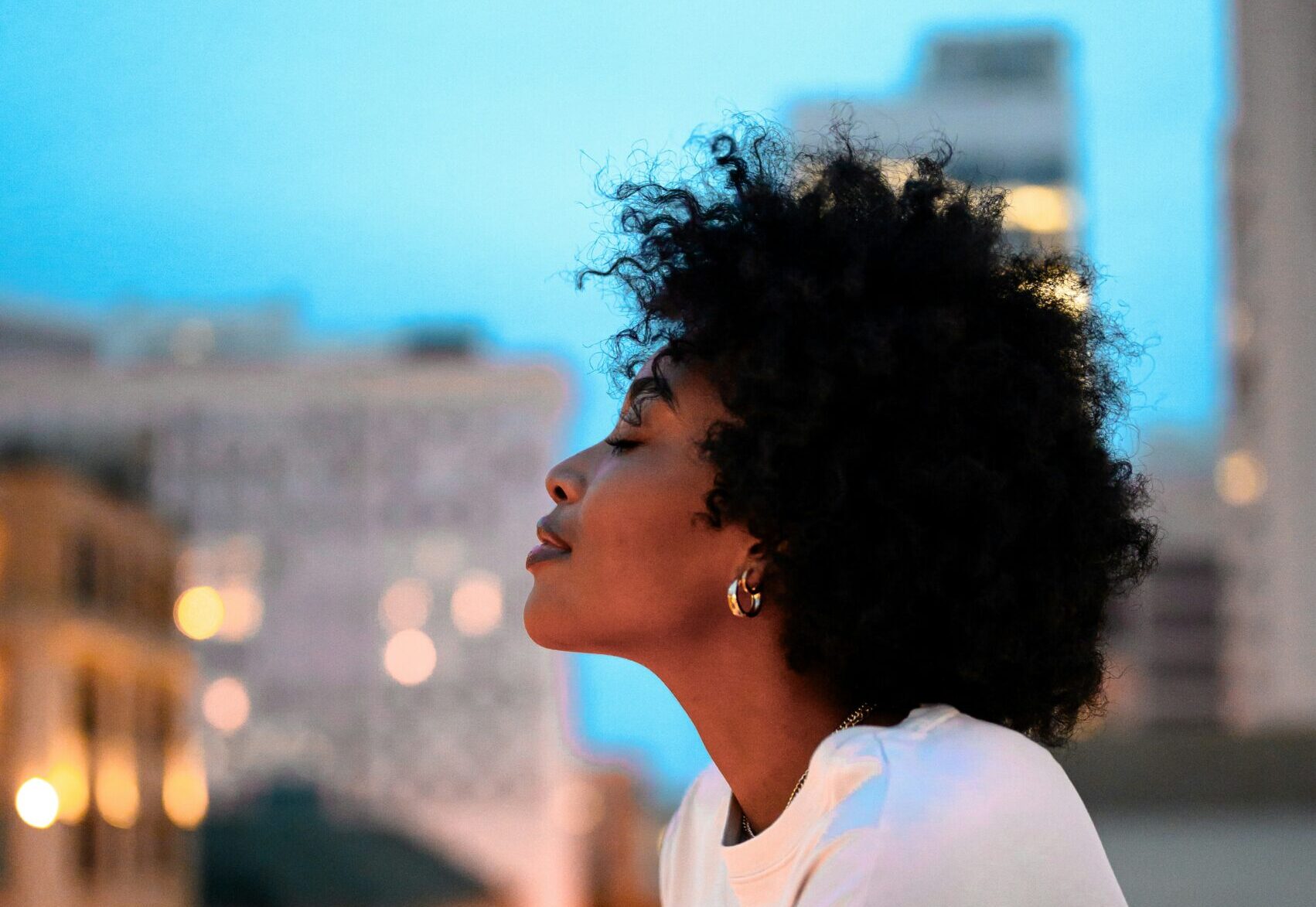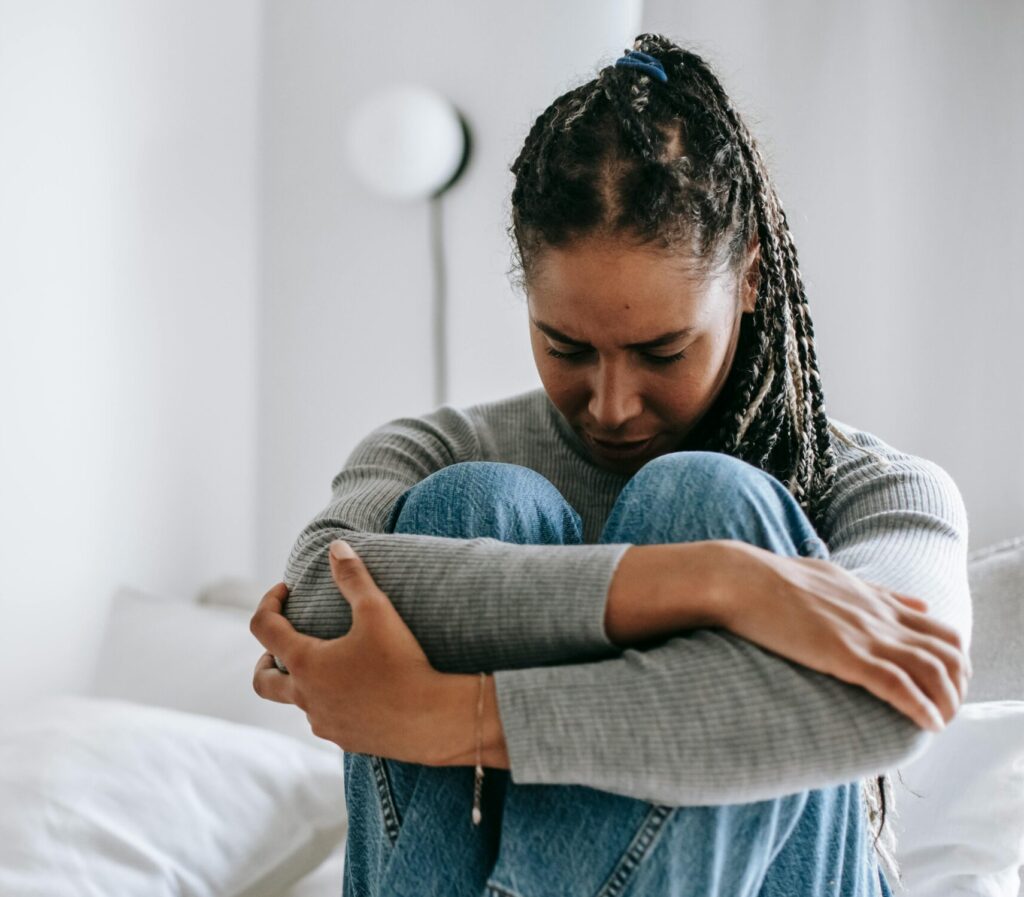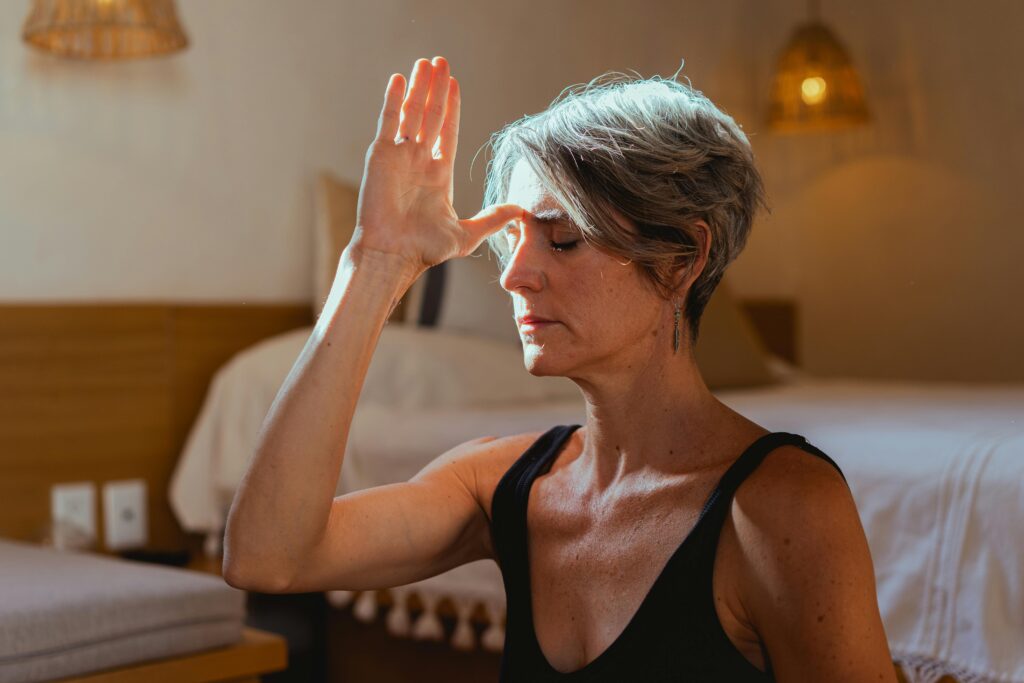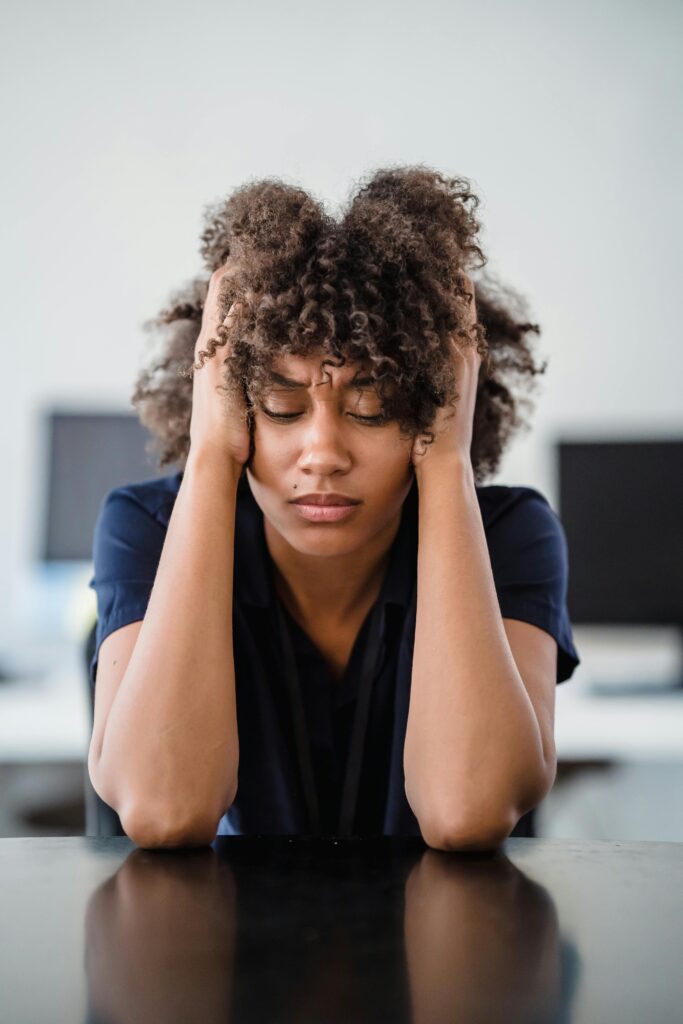Disclaimer: Not everyone who goes through menopause identifies as a woman and not all people who identify as women go through menopause. At Jayla, our core audience is people who identify as women, so we primarily use the word “women.” However, we’re working on specific content for people going through menopause who might not identify women. Inclusivity is a key value of ours, so bear with us!
Approaching perimenopause without having children, whether by choice, circumstance, or somewhere in between, can bring a mix of emotions and questions. This season often arrives with a whirlwind of hormone curveballs and identity puzzles you didn’t order. In a society that all too often frames womanhood around motherhood, this transition can feel especially isolating. But perimenopause is also a powerful moment to redefine what womanhood means for you and to find new ways to thrive.
The Physical Experience of Perimenopause Without Children
Let’s begin with the physical.
Perimenopause marks the transition phase before menopause when hormone levels begin to fluctuate and eventually decline. This change can bring a variety of physical symptoms such as hot flashes, night sweats, sleep disturbances, mood swings, and brain fog. These symptoms can vary widely from person to person, making the experience unpredictable.
Is Perimenopause Different for Women Without Children?
For women who have not had children, the hormonal changes during perimenopause are generally similar to those who are mothers. However, some may notice differences in how symptoms affect their bodies or emotional state. The body’s history of pregnancy and childbirth can influence hormone patterns, but perimenopause is a unique and individual journey for everyone.
Can You Still Get Pregnant During Perimenopause?
Yes. Although fertility declines during this phase, ovulation can still occur unpredictably, so pregnancy remains possible until menopause is reached. (1) For women who choose not to have children or whose fertility has naturally decreased, this uncertainty can be an added source of complexity during the transition. And for those hoping to conceive, the unpredictability of perimenopause can make planning a pregnancy more difficult, emotionally and physically.
While it can be confusing, you’re not alone. Whether you still hope to become a parent or have chosen a different path, this is your journey, and you get to decide what it looks like.
This is a moment to rethink the story we tell ourselves about fertility and womanhood, a perspective beautifully captured by Tracee Ellis Ross:
“Is it my fertility that is leaving me? Is it my womanhood? Or is it really neither? … I feel fertile with creativity, full of power, more and more a woman than I’ve ever been… My body’s ability to make a child is draining out of me—there’s a fire sale going on in my uterus, but I refuse to buy into that narrative.”
– Tracee Ellis Ross (2)
The Emotional and Identity Shift of Perimenopause Without Children
Perimenopause isn’t just about hot flashes and hormone charts. It can also trigger a quiet, sometimes jarring shift in how you see yourself, especially if you’re moving through it without children. Whether that was a clear choice, a winding road, or something you never got the chance to decide, this stage can stir up emotions that don’t always get space in the mainstream perimenopause conversation, and that you may not have expected yourself.
Our society still links womanhood with motherhood. From a young age, we’re surrounded by stories, expectations, and questions that assume raising children is part of the plan (thank you, Hollywood). So when your fertility starts to fade and you haven’t had kids, it can feel like something big is ending — even if you were never sure you wanted that path in the first place.
On top of that, COVID reshaped timelines in ways no one expected. For some, years that might’ve been spent connecting or exploring possibilities instead felt paused. It didn’t close every door, but it did change the rhythm. For many, that change still echoes.
In this context, the emotions perimenopause brings up can be complex. Some women feel grief. Others feel relief. Many feel a confusing cocktail of both, often served with a side of “Why am I crying over something I didn’t even want?” You might mourn the version of yourself that could have been a parent, or feel a strange sense of freedom now that the question has answered itself. And of course, you’re also expected to keep functioning like a normal adult while all of this is happening in your head and body.
This is a moment that deserves compassion. Not the polite kind. The real kind. The kind that Niecy Nash describes:
“I gave myself permission to feel what I felt in the moment and be unapologetic about it.”
– Niecy Nash (3)
It’s also a chance to take a good, long look at how we define womanhood. Because newsflash: being a woman isn’t defined by a list of reproductive milestones.. You are still creative, wise, powerful, sensual, loving, and completely whole. Your value never hinged on your fertility, no matter how many awkward family dinners or lifestyle magazines tried to suggest otherwise.
So if this phase feels like the end of a story you never got to write, that’s okay. But know this: it’s also the start of a new one. One where you get to reclaim what womanhood means for you. No rules. No expiration dates. No more pretending that motherhood is the only plotline worth living.
Breaking A Dual Taboo: Perimenopause and Child-Free Living
Women’s health topics are taboo because they challenge a long history of patriarchy, shame around the female body, and cultural discomfort with anything that isn’t youthful, fertile, or easily controlled. So imagine the double whammy of perimenopause and not having children?
This can be incredibly difficult to navigate. Yes, when we hear about unnecessary and old-fashioned taboos, we roll our eyes and feel a little irritated. But years of conditioning mean that they do sometimes affect us and exist deep within us, as well as the society around us.
To overcome both the conscious and unconscious beliefs we hold, along with those held by others, we first need to recognize them clearly and then intentionally replace them, one by one.
So let’s do some myth busting:
Myth 1: Aging without kids means a sad, lonely life.
The myth: If you don’t have children, you’ll spend your later years alone, staring longingly out of windows and whispering into teacups.
The truth: Loneliness doesn’t magically avoid parents and chase down everyone else. Meaningful connection comes in all shapes and sizes: through friends, partners, chosen family, creative passions, or community. So if your later years don’t look like a constant stream of bedtime stories and birthday parties, that’s perfectly okay. Life can still be full, rich, and totally worth celebrating. Don’t you doubt it!
Myth 2: You’ll regret not having kids. It’s just a matter of time.
The myth: All child-free women eventually end up with crushing regret, usually while talking to their house of cats.
The truth: Regret is not a one-size-fits-all emotion. Some women do feel it. Many don’t. And guess what? Parents have regrets too, they’re just sometimes not as socially acceptable to talk about. Choosing (or accepting) a life without children doesn’t guarantee regret. It’s a personal path, not a cautionary tale. Here’s to paving your own path.
Myth 3: Not having children means you’re selfish.
The myth: You skipped the hard work of parenting to live a life of ease and indulgence. How dare you.
The truth: Choosing not to have children doesn’t make someone selfish. Many child-free women are caregivers, mentors, volunteers, and deeply committed friends, partners, or leaders in their communities. Selfishness isn’t a reproductive outcome. It’s a human behavior, and it’s not limited to the child-free.
It’s also completely okay to choose yourself and embrace that decision. If being the “rich auntie,” the one who lives life on her own terms and supports loved ones in her own way, is the path you want, more power to you.
Myth 4: If you don’t have kids, your life must be a luxurious, well-rested fantasy.
The myth: No kids? You must be drinking green juice, doing yoga in Tuscany, and sleeping in every weekend.
The truth: If only! This fantasy is oddly persistent and completely disconnected from reality. Plenty of child-free women are juggling demanding jobs, caring for aging parents, managing chronic health issues, or just, you know, living regular human lives. So nope, not every day is a spa day or yoga retreat. Not having children doesn’t mean a life of leisure; it just means your energy goes elsewhere. And now, it’s your beautiful task to decide exactly where that energy flows.
Chelsea Handler sums it up:
“In America and everywhere, motherhood is treated as a woman’s central purpose in life, as if our destiny is to let a tiny stranger rip a hole through our Pikachu from the inside out… Even the Pope has slammed us, saying that not having children is selfish… It’s not selfish to forego parenthood. If anything, it’s self‑less to recognize it’s not for you.”
– Chelsea Handler (4)
Thriving Through Perimenopause Without Children
Think of perimenopause as a second adolescence — only this time, you’re older, wiser, and unapologetically part of Melanie’s “We Do Not Care Club”: no longer interested in fitting into anyone else’s expectations. It’s not a decline. It’s a powerful transformation.
Issa Rae, in a moment of classic calm power, summed it up like this:
“I’m extremely happy. I like my life, I like this selfishness, and I know that I have a window. I’ve always felt that way—that women, Black women especially, have a window when people are going to want to continue to see you and see what you can do. Then there are so many limitations placed upon you, and that does keep me up. I want to do as much as I can while I still can… I don’t feel pressured to have children.”
– Issa Rae (5)
In a world that keeps telling women (especially Black women) that their value has an expiration date or a baby count, choosing to build your life on your own terms is radical self-respect. Issa’s not rushing. She’s creating, thriving, and owning her time, and we all can too.
If this feels difficult to you, sharing openly about perimenopause with friends, partners, and wider networks can be an important and freeing step.
It’s not always easy to find your people when most social groups revolve around parenting, but that’s not the end of the story. There’s a rich world of community, creativity, and connection waiting for you outside the traditional script. You don’t need a diaper bag to belong. Just your full, unapologetic self.
Now let’s leave you with words of wisdom from Viola Davis:
“Living out loud is living a life that’s bigger than yourself.”
– Viola Davis
You’ve got this, Beautiful.
We’re here to help you navigate perimenopause, if ever and whenever you feel you need a little support.
Healthy eating doesn’t mean giving up your roots — it means embracing them in ways that nourish your heart.
References
1. UCLA Health. (2022). Pregnancy still possible during perimenopause. Retrieved from https://www.uclahealth.org/news/article/pregnancy-still-possible-during-perimenopause
2. Ross, T.E. (2020). Tracee Ellis Ross on fertility, identity, and power. Marie Claire, 27 May. Available at: https://www.marieclaire.com/celebrity/a32669316/tracee-ellis-ross-fertility-interview/ (Accessed 25 Jun. 2025)
3. Nash, N. (2021). Niecy Nash on love, identity, and reinvention. The Cut, 30 Mar. Available at: https://www.thecut.com/2021/03/niecy-nash-marriage-jessica-betts-interview.html (Accessed 25 Jun. 2025)
4. Rae, I. (2021). Issa Rae Talks ‘Insecure’, Her Career and the Pressure of Timelines. Self, 12 Oct. Available at: https://www.self.com/story/issa-rae-insecure-cover-interview (Accessed 25 Jun. 2025)
5. Handler, C. (2023). Why I’m Okay with Not Being a Mom. Parents. Available at: https://www.parents.com/chelsea-handler-essay-on-not-wanting-kids-7369905 (Accessed: 25 June 2025).
6. Rae, I. (2021). Issa Rae on Life as a Newlywed, Creating Boundaries, and Taking Care of One Another.
7. Davis, V. (2017). ‘Living out loud is living a life that’s bigger than yourself.’ People Magazine. Retrieved from https://people.com/awards/viola-davis-inspiring-quotes/



